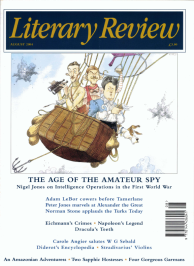John Dugdale
Star Story
The Book Nobody Read
By Owen Gingerich
William Heinemann 320pp £12.99
AMONG THE POTENTIAL attractions of Gingerich's study of Nicolaus Copernicus's De Revolutionibus Orbium Coelestium and its readers is its alluring multinational band of leading characters. First there is Copernicus himself, a busy Polish canon, doctor and lawyer who took so long - more than thirty years - to get his idea of a sun-centred cosmos into print that he was on his deathbed when it appeared in 1543. Then there's his disciple Rheticus, which coaxed him into publishing but went unacknowledged in the book and ended his academic career in disgrace after a homosexual scandal. Tycho Brahe was a peppery Dutch aristocrat whose observations were crucial to the new astronomy, although he drew the wrong conclusions from them. Johannes Kepler, a German, was forced to earn a living as imperial astrologer while using Brahe's work to turn Copernicus' hypothesis into a system. Finally there's Galileo Galilei, the polymathic genius humiliatingly summoned to Rome after indicating support for the heliocentric heresy.
To which can be added a colourful supporting cast including Giordano Bruno and John Dee, plus any number of popes and princes. And all against the historical backdrop of a Europe fissured by religious coflict and clashes between individual conscience and authority: a context which directly impinged on the progress

Sign Up to our newsletter
Receive free articles, highlights from the archive, news, details of prizes, and much more.@Lit_Review
Follow Literary Review on Twitter
Twitter Feed
The latest volume of T S Eliot’s letters, covering 1942–44, reveals a constant stream of correspondence. By contrast, his poetic output was negligible.
Robert Crawford ponders if Eliot the poet was beginning to be left behind.
Robert Crawford - Advice to Poets
Robert Crawford: Advice to Poets - The Letters of T S Eliot, Volume 10: 1942–1944 by Valerie Eliot & John Haffenden (edd)
literaryreview.co.uk
What a treat to see CLODIA @Lit_Review this holiday!
"[Boin] has succeeded in embedding Clodia in a much less hostile environment than the one in which she found herself in Ciceronian Rome. She emerges as intelligent, lively, decisive and strong-willed.”
Daisy Dunn - O, Lesbia!
Daisy Dunn: O, Lesbia! - Clodia of Rome: Champion of the Republic by Douglas Boin
literaryreview.co.uk
‘A fascinating mixture of travelogue, micro-history and personal reflection.’
Read the review of @Civil_War_Spain’s Travels Through the Spanish Civil War in @Lit_Review👇
John Foot - Grave Matters
John Foot: Grave Matters - Travels Through the Spanish Civil War by Nick Lloyd; El Generalísimo: Franco – Power...
literaryreview.co.uk